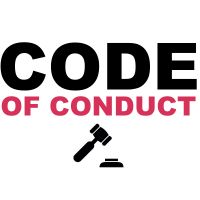 What? I need a code of conduct policy? That’s probably what you’re asking yourself. I’ve been to a lot of conferences, and every single one has had it’s own code of conduct policy. A code of conduct policy allows attendees, organizers, and sponsors (or vendors) alike on what is acceptable behavior at the event, and protect each individual from harm.
What? I need a code of conduct policy? That’s probably what you’re asking yourself. I’ve been to a lot of conferences, and every single one has had it’s own code of conduct policy. A code of conduct policy allows attendees, organizers, and sponsors (or vendors) alike on what is acceptable behavior at the event, and protect each individual from harm.
This code of conduct policy can cover anything from not condoning harassment of any kind, dress code, general behavior expectations, and how to report issues.
Officially, Wikipedia has code of conduct defined as:
A ‘code of conduct’ is a set of rules outlining the social norms and rules and responsibilities of, or proper practices for, an individual, party or organization. Related concepts include ethical, honor, moral codes and religious laws.
In fact, code of conduct policies are not just for conferences, they posted by individuals, companies, and government organizations.
- Goverment Example – US Senate Code of Official Conduct
- Company Example – Intel’s Code of Conduct
I’ve witnessed poor conduct many times. For example, without naming names, during one conference, one of my friends had been bit twice by an strangely, yet overly affectionate guy. He was a complete stranger. She didn’t invite such behavior. They hit it off initially in their conversation, and during the time I was mingling with other attendees, she was bit! She wasn’t quite sure on what to think of it, and slowly withdrew herself from the situation. The biggest part of that issue was that he was a speaker at the event. He knew better! That is not acceptable or professional behavior.
However, there have been other stories I’ve heard about like women being sexually harrassed, and even some men harrassed too. No one deserves to be treated unfairly.
The thing is, the event organizers can’t control individuals. They can only set in place a system of boundaries, saying “Here is they line. Cross it, and you’ll be escorted out.”
I recently adopted my own roughly written Conference Code of Conduct Policy at Blondish.net. It’s important to me that people are aware where I stand when it comes to conferences. I don’t tolerate harrassment of any kind.
If you attend or present at conferences, you may want to adopt your own conference code of conduct policy for your website. The reason is that some sponsors are starting to ask for sponsees to have a code of conduct policy somewhere on their website. This allows the company doing the sponsoring to know where their sponsee stands, and can be a relief in case the sponsee is known to be controversial on their website. They want a sponsor that can represent their values.
The other reason, is to allow your readers to know that this behavior can also be extended to the behavior on your website or social network channels. It’s important to have consistency.
If you’d like to adopt your own, here’s a conference anti-harassment policy template that you can adopt and alter to your needs. It is licensed under the Creative Commons Zero license, or public domain license.
Do you have a code of conduct policy for your blog or website?
Hi,
This is nice post for conference you want to code of conduct policy and gets better response.